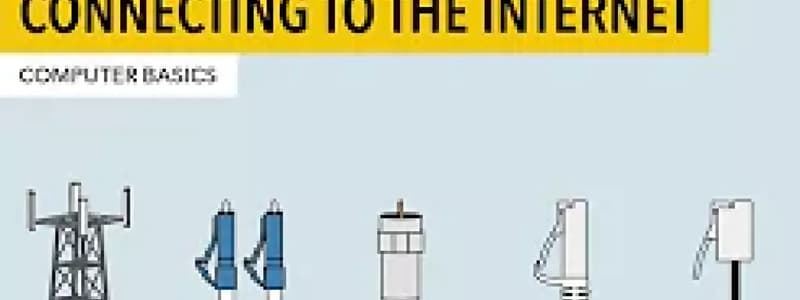Podcast
Questions and Answers
What is the primary advantage of having a dial-up internet connection over other types of connections?
What is the primary advantage of having a dial-up internet connection over other types of connections?
- Faster speeds for watching videos
- Reliability in areas with poor cable infrastructure
- Availability in remote areas (correct)
- Cost-effectiveness for occasional use
Which type of internet connection is typically used for smartphones and can also be used for home internet connections?
Which type of internet connection is typically used for smartphones and can also be used for home internet connections?
- Fiber
- DSL
- Cable
- Cellular (correct)
What is the primary purpose of a modem in setting up an internet connection?
What is the primary purpose of a modem in setting up an internet connection?
- To connect to the internet service provider's network (correct)
- To provide a wireless connection to devices
- To enable WPA2 or WPA3 encryption for security
- To broadcast the internet connection throughout the home
What is the primary benefit of using a fiber internet connection over DSL and cable connections?
What is the primary benefit of using a fiber internet connection over DSL and cable connections?
What is the primary purpose of a wireless router in setting up a wireless home network?
What is the primary purpose of a wireless router in setting up a wireless home network?
What is the primary reason for choosing a strong password when setting up a wireless home network?
What is the primary reason for choosing a strong password when setting up a wireless home network?
What is the primary role of an Internet Service Provider (ISP) in setting up an internet connection?
What is the primary role of an Internet Service Provider (ISP) in setting up an internet connection?
What is the primary purpose of enabling WPA2 or WPA3 encryption when setting up a wireless home network?
What is the primary purpose of enabling WPA2 or WPA3 encryption when setting up a wireless home network?
Flashcards are hidden until you start studying
Study Notes
Benefits of Home Internet Connection
- Having a home internet connection provides access to various online services such as email, news, shopping, TV shows, and more.
- A working internet connection enables the creation of a wireless home network, allowing multiple devices to connect to the internet.
Types of Internet Connections
- Dial-up: Connects to a phone line, slower than other types, but may be the only option in some areas.
- DSL (Digital Subscriber Line): Plugs into a phone line, offering faster speeds than dial-up, making it suitable for watching videos, playing games, and browsing the web.
- Cable: Uses a cable TV connection, providing faster speeds than dial-up, similar to DSL.
- Fiber: The fastest type of broadband, using fiber optic cables, offering speeds exceeding DSL and cable, but may not be available everywhere and tends to be more expensive.
- Cellular (4G/LTE/5G): A type of wireless internet connection, often used by smartphones, but can also be used for home internet connections, depending on location.
Setting Up an Internet Connection
- To get an internet connection, purchase a plan from an Internet Service Provider (ISP).
- The ISP will guide the connection process, sending a technician to the home to set up the connection.
- The ISP may provide a modem and set it up, or users can buy a modem and set it up themselves using included instructions.
Setting Up a Wireless Home Network
- Requires a wireless router, which takes the internet connection from the modem and broadcasts it throughout the home.
- May already have a wireless router built into the modem, or can be purchased separately.
- To set up the network, follow the router's instructions, choosing a network name (SSID) and enabling WPA2 or WPA3 encryption for security.
- Choose a strong password, and then connect devices to the network by selecting the network name and typing the password.
Benefits of Home Internet Connection
- Access to various online services like email, news, shopping, TV shows, and more is provided by a home internet connection.
- A working internet connection enables the creation of a wireless home network, allowing multiple devices to connect to the internet.
Types of Internet Connections
- Dial-up: Connects to a phone line, and is slower than other types, but may be the only option in some areas.
- DSL (Digital Subscriber Line): Plugs into a phone line, offering faster speeds than dial-up, suitable for watching videos, playing games, and browsing the web.
- Cable: Uses a cable TV connection, providing faster speeds than dial-up, similar to DSL.
- Fiber: The fastest type of broadband, using fiber optic cables, offering speeds exceeding DSL and cable, but may not be available everywhere and tends to be more expensive.
- Cellular (4G/LTE/5G): A type of wireless internet connection, often used by smartphones, but can also be used for home internet connections, depending on location.
Setting Up an Internet Connection
- Purchase a plan from an Internet Service Provider (ISP) to get an internet connection.
- The ISP guides the connection process, sending a technician to the home to set up the connection.
- The ISP may provide and set up a modem, or users can buy a modem and set it up themselves using included instructions.
Setting Up a Wireless Home Network
- Requires a wireless router, which takes the internet connection from the modem and broadcasts it throughout the home.
- The wireless router may be built into the modem or purchased separately.
- Set up the network by following the router's instructions, choosing a network name (SSID) and enabling WPA2 or WPA3 encryption for security.
- Choose a strong password, and then connect devices to the network by selecting the network name and typing the password.
Studying That Suits You
Use AI to generate personalized quizzes and flashcards to suit your learning preferences.




